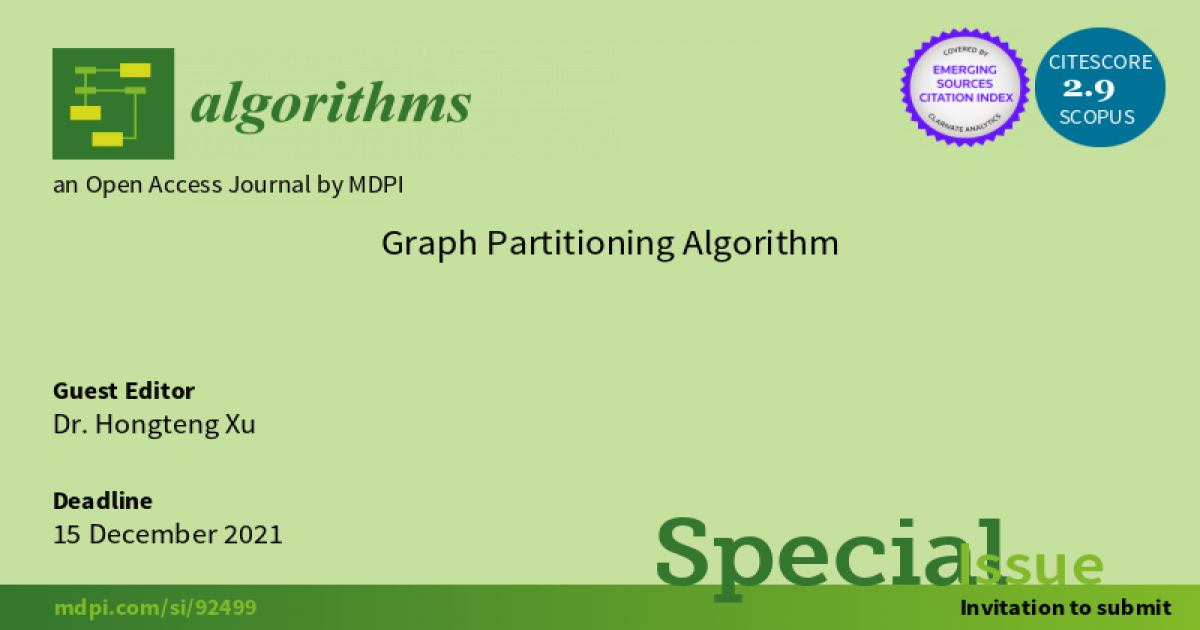- 2.1Impact Factor
- 4.5CiteScore
- 20 daysTime to First Decision
Graph Partitioning Algorithm
Special Issue Information
Dear Colleagues,
Graph partitioning algorithms are significant in supporting applications in various fields such as network modeling, community detection, protein clustering, and molecule analysis. Recently, with the development of machine learning and artificial intelligence, many learning-based graph partitioning algorithms have been proposed and have achieved encouraging performance on several benchmarks. Currently, besides conventional combinatorial optimization problems, the study of graph partitioning algorithms is highly correlated with unsupervised and semi-supervised learning tasks, i.e., node representation and clustering, and reinforcement learning techniques. Therefore, introducing new graph partitioning algorithms, especially those learning-based methods, and promoting their innovative applications are at the heart of this Special Issue. We invite you to submit high-quality papers to the Special Issue on "Graph Partitioning Algorithm", with subjects covering the whole range from theory to applications. The topics we are interested in include but are not limited to:
- Scalable and/or approximate combinatorial optimization for graph partitioning;
- Learning-based graph partitioning;
- Applications of graph partitioning on bioinformatics, chemistry, and social networks;
- Theoretical analysis of graph partitioning methods.
Dr. Hongteng Xu
Guest Editor
Manuscript Submission Information
Manuscripts should be submitted online at www.mdpi.com by registering and logging in to this website. Once you are registered, click here to go to the submission form. Manuscripts can be submitted until the deadline. All submissions that pass pre-check are peer-reviewed. Accepted papers will be published continuously in the journal (as soon as accepted) and will be listed together on the special issue website. Research articles, review articles as well as short communications are invited. For planned papers, a title and short abstract (about 250 words) can be sent to the Editorial Office for assessment.
Submitted manuscripts should not have been published previously, nor be under consideration for publication elsewhere (except conference proceedings papers). All manuscripts are thoroughly refereed through a single-blind peer-review process. A guide for authors and other relevant information for submission of manuscripts is available on the Instructions for Authors page. Algorithms is an international peer-reviewed open access monthly journal published by MDPI.
Please visit the Instructions for Authors page before submitting a manuscript. The Article Processing Charge (APC) for publication in this open access journal is 1800 CHF (Swiss Francs). Submitted papers should be well formatted and use good English. Authors may use MDPI's English editing service prior to publication or during author revisions.
Keywords
- graph partitioning
- node representation and clustering
- unsupervised and semi-supervised learning
- reinforcement learning
- network analysis
- molecule analysis

Benefits of Publishing in a Special Issue
- Ease of navigation: Grouping papers by topic helps scholars navigate broad scope journals more efficiently.
- Greater discoverability: Special Issues support the reach and impact of scientific research. Articles in Special Issues are more discoverable and cited more frequently.
- Expansion of research network: Special Issues facilitate connections among authors, fostering scientific collaborations.
- External promotion: Articles in Special Issues are often promoted through the journal's social media, increasing their visibility.
- Reprint: MDPI Books provides the opportunity to republish successful Special Issues in book format, both online and in print.


